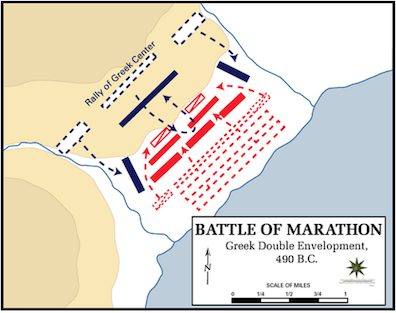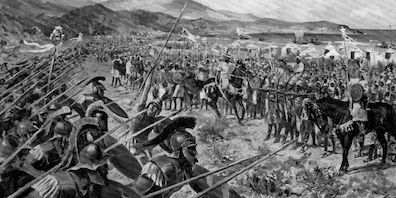Dan Dawson's praise of Ireland's natural beauties elicits a
classical comment from Simon Dedalus: "And Xenophon looked
upon Marathon...and Marathon looked on the sea." He is quoting
from a verse of Byron's, but inaccurately, and his
reasons for alluding to the poem are not entirely clear.
In the midst of the third canto of his comic epic Don
Juan (1821), Byron inserts a 16-stanza "hymn" to Greece,
expressing his despairing wish that the country might throw
off Turkish rule. The third stanza of the hymn recalls his
1810 visit to Marathon, where in 490 BCE an Athenian army
defeated a much larger Persian force:
The Mountains look on Marathon–
And Marathon looks on the Sea;
And musing there an hour Alone,
I dreamed that Greece might still be free
For standing on the Persian’s Grave,
I could not deem myself a Slave.
Persian troops serving Darius I landed on the Attic coast
near Marathon, a town surrounded by low mountains, and were
soundly defeated by the Athenians. (A runner was sent back to
Athens bearing the news, inspiring the 26-mile race called the
marathon.) The Athenian historian Xenophon was not present at
this battle, however––he was born more than half a century
later. Apparently Dedalus has confused Byron's mention of
Marathon looking on the sea with the campaign of the Ten
Thousand in Persia, whose escape from hostile armies was
announced with the cry "Thalatta! Thalatta!"
upon reaching the Black Sea.
It is easy to imagine this confusion arising from dimly
remembered shards of Greek-Persian battles, encouraged by the
human brain's love of similar sounds like "Xenophon" and
"Marathon." Assuming that Joyce was aware of the mistake, it
is also understandable that he might have wanted to put it in
the mouth of one of the men in the newspaper office, where hot
air blows nonstop and many dubious claims are made. The men's
fact-challenged puffery about Ireland's greatness and its
cruel fate reprises the scene in the Dubliners story
"Grace" where Tom Kernan's friends extol the glories of the
Catholic church, making one intellectual error after another.
But what is Simon Dedalus saying? Dawson's speech has
been picturing a stream that runs "'neath the shadows cast
o'er its pensive bosom by the overarching leafage of the
giants of the forest," which apparently prompts Simon to
recall a poem in which mountains look down on the town and the
town looks down on the sea. Is nothing more than this
imagistic association at work, or is he also thinking of
Ireland's dream of freeing itself from imperial domination?
Equating Ireland with Greece and Britain with Persia would be
entirely consistent with other symbolic associations made in Aeolus,
like Pyrrhus struggling to prevent Roman domination and Moses
leading his people out of Egypt. (In a reversal of such
symbolism, Ireland also is linked with Troy, a city destroyed
by a massive foreign army.) But Simon does not develop this
associative logic. Nor, as far as I can tell, does anyone else
in Ulysses.


